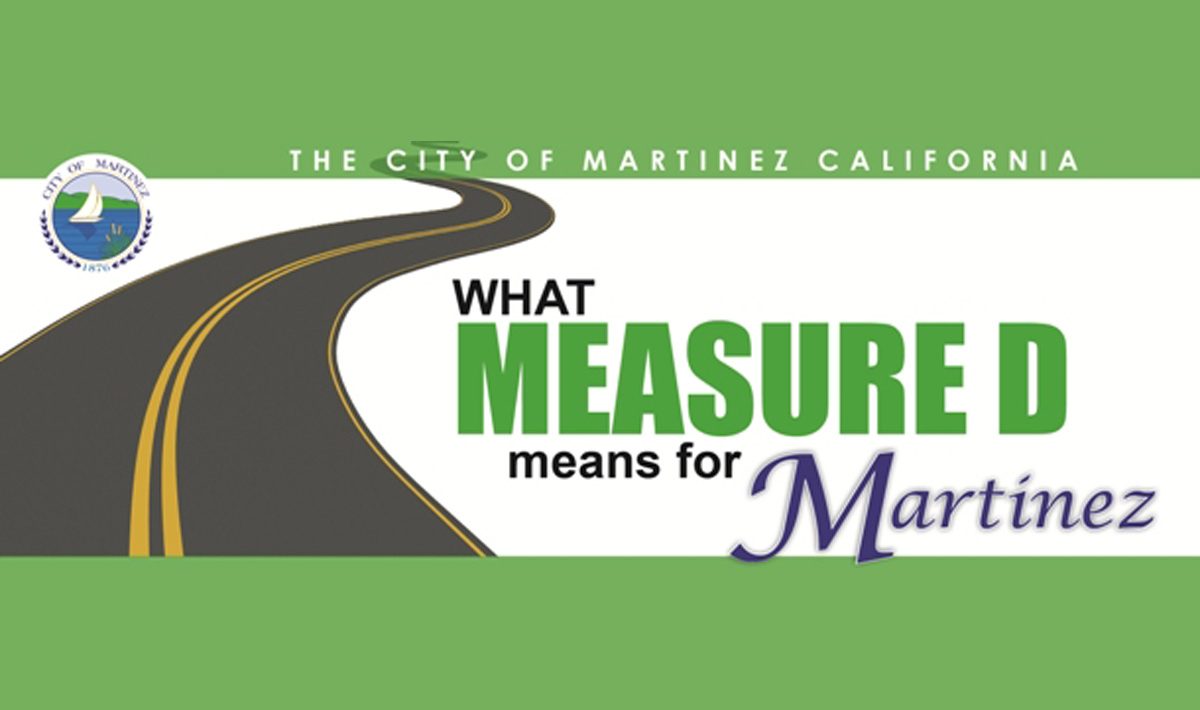MARTINEZ, Calif. – At one time, Martinez had about $450,000 in gasoline tax and other revenues to spend on road repairs.
With local voters’ approval of Measure D in 2016 and California’s fuel taxes and vehicle registration fees increases through Senate Bill 1 sustained by voters last year, Martinez has nearly ten times that money to spend each year, outgoing City Engineer Tim Tucker said.
Speaking at Tuesday’s meeting of the Measure D Oversight Committee, he said the expenditures should improve the pavement condition that is evaluated every two years in a report Tucker used to call “the bad news.”
In fact, the Metropolitan Transportation Commission’s report showed Martinez’s streets were the second worst in Contra Costa County, surpassed only by those in Orinda.
With such limited funds, Martinez sometimes waited to tackle repairs, saving one year’s revenue to combine it with another year’s just to be able to afford certain projects.
Measure D changed that.
It’s a voter-approved half-cent sales tax with revenues that can be used only on local road repairs and maintenance. It’s bringing in more money than expected, Tucker said, and residents are seeing road repair projects taking place throughout the city during “construction season.”
When it placed the measure on the ballot, Martinez City Council thought it would boost road repair revenue by $2.1 million. Instead, the money that came in during 2018 reached about $3.5 million.
Combined with SB 1 and gas taxes, Martinez has about $4.5 million annually to spend on its streets.
But Martinez has a backlog of streets that need attention, Tucker said. So the new money still has to be spent wisely.
The citizens oversight committee represents the public and makes sure that’s what is happening. The panel doesn’t weigh in on specific projects or contractors, but it can offer overall suggestions.
At Tuesday’s meeting, members learned the city has two construction accounts.
Under Account C1061 in Fiscal Year 2017-18, the city budgeted more than $1.2 million for construction and more than $400,000 for contingencies, as well as $75,000 for management and inspection and $60,000 for engineering, for a total of $1,816,000, the same amount of available funds.
In the same fiscal year, the city had $600,000 as an allocation balance, gas tax revenues and Measure J funds. The Measure D allocation was more than $1.3 million.
The city also transferred $135,000 in gas tax revenues to the Linton Terrace project, which involved culvert replacement, so stormwater and Federal Emergency Management Agency money also was used after two sides of the bank were lost.
“We barely got it done in time,” Tucker said. But the job was finished before this winter’s rains began.
The Measure D pavement rehabilitation project for Fiscal Year 2018-19 is in Account C1062, Tucker said, and it has received Council authorization.
This budget is for funds totalling $2,725,000, of which more than $2.4 million for the construction contract, $150,000 for contingencies, $63,593 for management and inspections and nearly $75,000 for engineering and support.
Of this, $1.7 million would come from the Capital Improvement Project Measure D allocation, and the rest would be an additional proposed Measure D allocation of $1.025 million.
These street improvements will be taking place throughout Martinez, addressing residential streets first because they are in the worse condition, Tucker explained,
The work takes place in steps, with potholes being repaired first before a resurfacing seal is applied, he said.
Tucker said he has heard from many residents who want the city to repave its streets,. But even with the additional revenues, Martinez can’t afford that cost, he said.
Besides, the base repair and resurfacing approach holds up well for at least 10 years, he said.
Martinez staff and Council were anxious to get road repairs underway as fast as possible, he said. That early start was done both to show residents their tax dollars truly would be spent on road repair and also to expedite construction.
That jump start put the city out of step with other agencies when it comes to seeking bids. To get better prices, Martinez would need to promote its projects earlier so contracts are in place once the rainy season ends.
Tucker said city staff and the Council moved faster to assemble a list of streets to be repaired next, and to get that list approved.
“It puts us in a good position to get bids prior to construction season,” Tucker said.
Finance Director David Glasser said the city has received a total of $6.6 million to date in Measure D revenues.
Oversight Committee members Stephen Fritz and Satinder Malhi wondered whether the city should bank some of that money against future recessions, when spending and those sales tax revenues could decline.
But Tucker said a better approach is to use the money on roads in need of repair, because damaged roads decline quickly. The longer repairs are delayed, the more expensive they’ll be, and those costs rise dramatically, he said.
“Is there anything we can say we learned to hedge against the inevitable downturn?” Fritz asked.
“It’s too early in the program,” Tucker said. However he suggested that at the midpoint of the 15-year sales tax, city staff and the committee should consider whether a new ballot measure should be proposed.
Voters could decide whether to keep the revenue stream flowing so Martinez never has streets in such poor condition again.
Malhi suggested climate change not only could affect city roads but the costs of repairs. He said the winter rains have caused a “fair share of potholes.”
But he also urged the city to promote its Measure D projects, such as taking “before” and “after” photographs of a repaired street.
“Don’t be shy about your success,” he advised. “We’ve delivered.”





